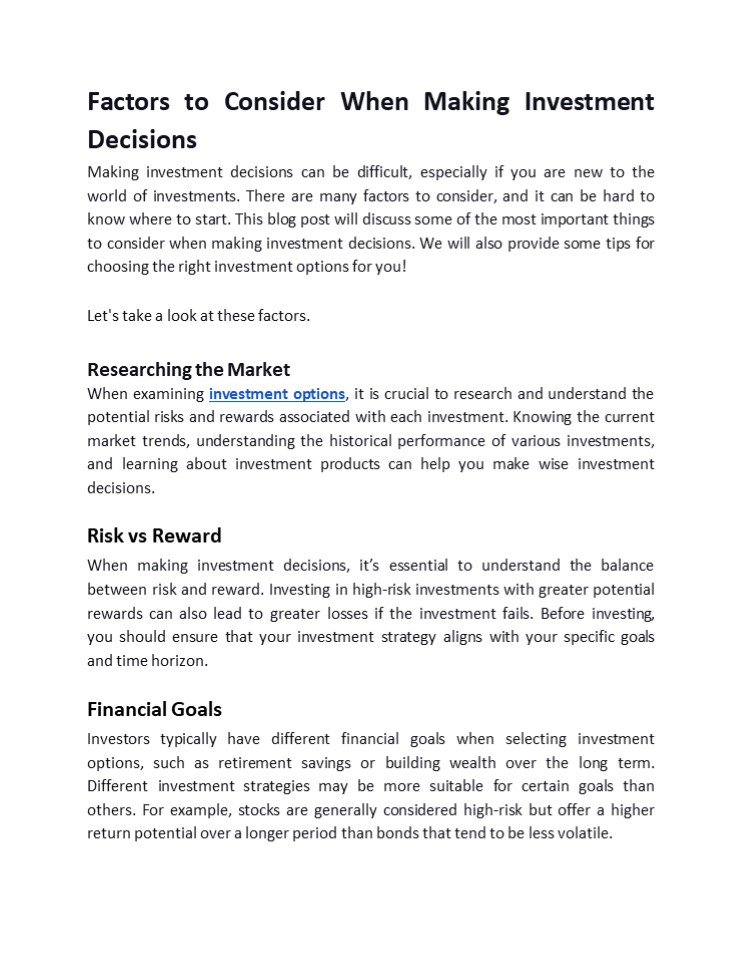Factors to Consider When Making Investment Decisions - PowerPoint PPT Presentation
Title:
Factors to Consider When Making Investment Decisions
Description:
Making investment decisions can be difficult, especially if you are new to the world of investments. There are many factors to consider, and it can be hard to know where to start. This blog post will discuss some of the most important things to consider when making investment decisions. We will also provide some tips for choosing the right investment options for you! – PowerPoint PPT presentation
Number of Views:2
Title: Factors to Consider When Making Investment Decisions
1
Factors to Consider When Making Investment
Decisions
Making investment decisions can be difficult,
especially if you are new to the world of
investments. There are many factors to consider,
and it can be hard to know where to start. This
blog post will discuss some of the most important
things to consider when making investment
decisions. We will also provide some tips for
choosing the right investment options for you!
- Let's take a look at these factors.
- Researching the Market
- When examining investment options, it is crucial
to research and understand the potential risks
and rewards associated with each investment.
Knowing the current market trends, understanding
the historical performance of various
investments, and learning about investment
products can help you make wise investment
decisions. - Risk vs Reward
- When making investment decisions, its essential
to understand the balance between risk and
reward. Investing in high-risk investments with
greater potential rewards can also lead to
greater losses if the investment fails. Before
investing, you should ensure that your
investment strategy aligns with your specific
goals and time horizon. - Financial Goals
- Investors typically have different financial
goals when selecting investment options, such as
retirement savings or building wealth over the
long term. Different investment strategies may
be more suitable for certain goals than others.
For example, stocks are generally considered
high-risk but offer a higher return potential
over a longer period than bonds that tend to be
less volatile.
2
Investment Tenure Investment tenure is one of the
most important factors to consider when making
investment decisions. The investment tenure
refers to the amount of time you plan to invest
your funds. Generally, investment tenures range
from short-term (1-2 years) to long-term (5
years). Each investment option has its own pros
and cons, depending on the investor's needs and
preferences. For example, short-term investment
options are generally more liquid and allow
quicker access to capital but may not yield as
high returns as long-term investments. Long-term
investments can provide stability and potentially
higher returns over several years but require a
longer commitment from investors. Risk
Tolerance Another factor to consider when making
investment decisions is your risk tolerance.
Different investment options can involve
different levels of risk, so it is vital to
assess your attitude towards taking risks and
determine what type of investment best suits
you. If you're comfortable with more risky
investment options, such as stocks, you may be
willing to take on more volatile investments for
the potential for higher returns. On the other
hand, if you prefer a lower-risk approach, you
might choose less volatile investments like
bonds or mutual funds that offer steady but
modest returns. Liquidity When making
investment decisions, liquidity is a key factor
to consider. Liquidity refers to how quickly and
easily an asset can be converted into cash
without significant loss of value. More liquid
assets require less time and effort to convert
into cash, whereas assets with lower liquidity
take longer to access the funds or may not be
able to access them.
3
When investing, it's important to determine how
quickly you need access to your money to avoid
having too much of your capital tied up in
illiquid investments. The Bottom Line When it
comes to making investment decisions, many
factors must be taken into consideration. With
careful planning and an eye on the future, you
can develop a smart investment approach that
meets your needs and helps you reach your
financial goals.































